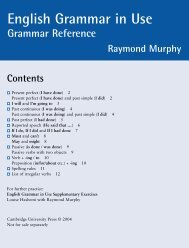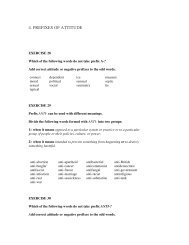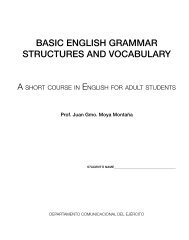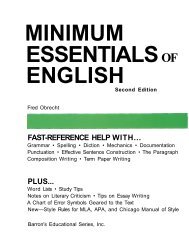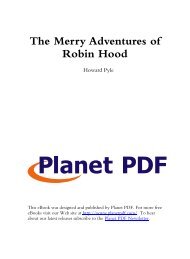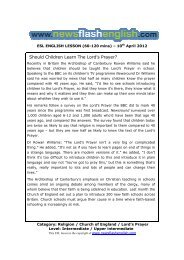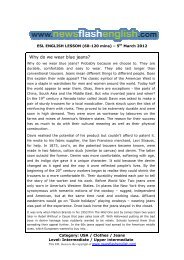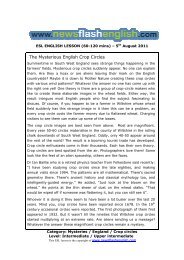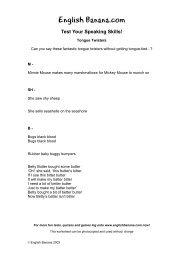A <strong>Grammar</strong> <strong>of</strong> <strong>the</strong> <strong>English</strong> <strong>Tongue</strong> 56born, bairn, comes from pario; and a bear, at least if it be <strong>of</strong> Latin original,from fera. Thus perch, a fish, from perca; but perch, a measure, frompertica, and likewise to perch. To spell is from syllaba; but spell, aninchantment, by which it is believed that <strong>the</strong> boundaries are so fixed inlands that none can pass <strong>the</strong>m against <strong>the</strong> master's will, from expello; andspell, a messenger, from epistola; whence gospel, good-spell, or god-spell.Thus freese, or freeze, from frigesco; but freeze, an architectonick word,from zophorus; but freeze, for cloth, from Frisia, or perhaps from frigesco,as being more fit than any o<strong>the</strong>r for keeping out <strong>the</strong> cold.There are many words among us, even monosyllables, compounded <strong>of</strong> twoor more words, at least serving instead <strong>of</strong> compounds, and comprising <strong>the</strong>signification <strong>of</strong> more words that one; as, from scrip and roll comes scroll;from proud and dance, prance; from st <strong>of</strong> <strong>the</strong> verb stay or stand and out, ismade stout; from stout and hardy, sturdy; from sp <strong>of</strong> spit or spew, and out,comes spout; from <strong>the</strong> same sp with <strong>the</strong> termination in, is spin; and addingout, spin out: and from <strong>the</strong> same sp, with it, is spit, which only differs fromspout in that it is smaller, and with less noise and force; but sputter is,because <strong>of</strong> <strong>the</strong> obscure u, something between spit and spout: and by reason<strong>of</strong> adding r, it intimates a frequent iteration and noise, but obscurelyconfused; whereas spatter, on account <strong>of</strong> <strong>the</strong> sharper and clearer vowel a,intimates a more distinct poise, in which it chiefly differs from sputter.From <strong>the</strong> same sp and <strong>the</strong> termination ark, comes spark, signifying a singleemission <strong>of</strong> fire with a noise; namely sp, <strong>the</strong> emission, ar, <strong>the</strong> more acutenoise, and k, <strong>the</strong> mute consonant, intimates its being suddenly terminated;but adding l, is made <strong>the</strong> frequentative sparkle. The same sp, by adding r,that is spr, implies a more lively impetus <strong>of</strong> diffusing or expanding itself; towhich adding <strong>the</strong> termination ing, it becomes spring: its vigour spr imports;its sharpness <strong>the</strong> termination ing; and lastly in acute and tremulous, endingin <strong>the</strong> mute consonant g, denotes <strong>the</strong> sudden ending <strong>of</strong> any motion, that it ismeant in its primary signification, <strong>of</strong> a single, not a complicated exilition.Hence we call spring whatever has an elastick force; as also a fountain <strong>of</strong>water, and <strong>the</strong>nce <strong>the</strong> origin <strong>of</strong> any thing: and to spring, to germinate, andspring, one <strong>of</strong> <strong>the</strong> four seasons. From <strong>the</strong> same spr and out, is formedsprout, and wit <strong>the</strong> termination ig, sprig; <strong>of</strong> which <strong>the</strong> following, for <strong>the</strong>most part, is <strong>the</strong> difference: sprout, <strong>of</strong> a grosser sound, imports a fatter or
A <strong>Grammar</strong> <strong>of</strong> <strong>the</strong> <strong>English</strong> <strong>Tongue</strong> 57grosser bud; sprig, <strong>of</strong> a slenderer sound, denotes a smaller shoot. In likemanner, from str <strong>of</strong> <strong>the</strong> verb strive, and out, comes strout, and strut. From<strong>the</strong> same str, and <strong>the</strong> termination uggle, is made struggle; and this glimports, but without any great noise, by reason <strong>of</strong> <strong>the</strong> obscure sound <strong>of</strong> <strong>the</strong>vowel u. In like manner, from throw and roll is made troll, and almost in<strong>the</strong> same sense is trundle, from throw or thrust, and rundle. Thus graff orgrough is compounded <strong>of</strong> grave and rough; and trudge from tread or trot,and drudge.In <strong>the</strong>se observations it is easy to discover great sagacity and greatextravagance, an ability to do much defeated by <strong>the</strong> desire <strong>of</strong> doing morethan enough. It may be remarked,1. That Wallis's derivations are <strong>of</strong>ten so made, that by <strong>the</strong> same license anylanguage may be deduced from any o<strong>the</strong>r.2. That he makes no distinction between words immediately derived by usfrom <strong>the</strong> Latin, and those which being copied from o<strong>the</strong>r languages, can<strong>the</strong>refore afford no example <strong>of</strong> <strong>the</strong> genius <strong>of</strong> <strong>the</strong> <strong>English</strong> language, or itslaws <strong>of</strong> derivation.3. That he derives from <strong>the</strong> Latin, <strong>of</strong>ten with great harshness and violence,words apparently Teutonick; and <strong>the</strong>refore, according to his owndeclaration, probably older than <strong>the</strong> tongue to which he refers <strong>the</strong>m.4. That some <strong>of</strong> his derivations are apparently erroneous.* * * * *SYNTAX.The established practice <strong>of</strong> grammarians requires that I should here treat <strong>of</strong><strong>the</strong> Syntax; but our language has so little inflection, or variety <strong>of</strong>terminations, that its construction nei<strong>the</strong>r requires nor admits many rules.Wallis, <strong>the</strong>refore, has totally neglected it; and Jonson, whose desire <strong>of</strong>following <strong>the</strong> writers upon <strong>the</strong> learned languages made him think a syntax




